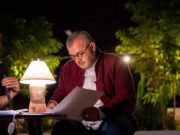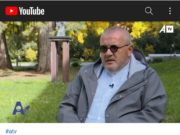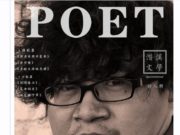W.N. Herbert (born Dundee, 1961) is author of eight books of poetry and five pamphlets, most recently Omnesia and Murder Bear, both 2013. He is editor of Strong Words, an anthology of poetic manifestos, and collections of translations from Bulgarian, Chinese, and Somali. He is Professor of Poetry and Creative Writing at Newcastle University, and a Fellow of the Royal Society of Literature. His books have received four Poetry Book Society Recommendations, and he has been shortlisted twice for the T.S. Eliot Prize, as well as for the Forward Prize. In 2014 he received a Cholmondeley Award.The Dream of the Airport
The car hire company bestows upon you the great gift
of abandoning you to the airport overnight. Returned
to the eternal striplights of your early travels,
you wrap your head in the checkered pakama, place
the green Ethiopian Airways eyemask on your face,
and insert the orange earplugs which can’t quite block
the music of The Continuity out – that shuffling of the less
lucky travellers, banging of trays as their diminished
possessions are scanned, ping and pronouncement
of the missing’s names by the same old siren. How many
decades have you been passed through here without
ever leaving home? Try escaping into your recurrent dream:
the one about an airport. Then it’s four. Abandon sleep
to walk directly through the dream of the airport:
its labyrinth as one bright uncomplicating hall.
Your Minotaur passes, long horns carved with lists,
memoranda, minutiae of the dates he fears. His horns
score both walls at once, his hooves click and chip
this marble. Here’s your chance to miss tomorrow
in its role as The Next Episode, to lose the need
for such times to pass, that dumb urgency. Go out
into the night’s cool breezes: be glad the bus
which will return you to your place in the action
has not yet arrived. Look up: there are still no birds,
no stars have been allocated to you. You forget, but
this is the hour at which your father died. The night
is like a charcoal horse pacing in its ash paddock –
it chafes itself away as it walks. Walk back into
the long departure hall and pass among the pissed-off
officials, the ecstatic sleepers. We are already within
Asclepius’s temple: look, at the opposite end
she’s still asleep, the woman you must travel with.
The furniture of your luggage surrounds her like a room
with no walls. She is sleeping in public: we are all
sleeping in public, together, sleeping in public together
forever. Go to her and rewind yourself in the shawl
and pray, your head to her head. The lights keep burning.
Go to her and dream about the airport in the night.
Lion in Sidecar
(For Pedro and Richard)
It’s a black and white wall of death,
breathless with blur: you can almost hear
the fleet trundle of the motorcycle wheels
on the cheap plywood planks –
it’s a barrel of roar.
The lion is really getting into it
at ninety degrees to vertical:
leaning into the rush of air,
eyes slitted, mane flaring like
the Sun in a speeded-up, unhinging orrery,
like Jean Marais in the underworld’s gale.
Begoggled Heurtebise bears him bravely, always
upward, though the lion knows
in these realms up is always
down. Does the lion know
where he is going? Does the lion know
where we are going? Our animal stares straight ahead
as the cycle ascends to the watchers along the brim.
Byron’s Mask
for the Venetian Carnevale
looked very like the face and hair
of Byron, as though he had
a Lord Byron’s head-shaped onion
for a head, and could simply pull
skin after skin off, each revealing
a slightly smaller Lord Byron’s head
until the final tiny head, still
with Byron’s features perfectly picked out
like a Patryushka Giovanni Don-doll
and, when this last shallot of Lordy Gordon
was shed, as though he would walk around
with no head at all. In fact
it was in this manner that he wrote all his best poems.


















